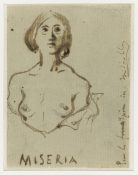
“Why would we listen to Victor Hugo today?” I asked actor and philanthropist Hugh Jackman. I’d found myself talking with Jackman as part of my search to understand the power of Hugo’s Les Misérables and its progeny. I was delighted to find that Jackman marvels at Hugo’s masterpiece as much as I do. One of the most famous novels ever written and a triumph of narrative art, Les Misérables speaks deeply to us both despite its daunting length. Hugo’s language lifts me, and his loving characters unendingly inspire—especially his hero, the ex-convict Jean Valjean, whom Jackman played in the 2012 movie version and got to know intimately, as the insights he shared with me will show.
Victor Hugo’s complete works inhabit forty-one inches of my bookshelves. In those poems, plays, novels, essays, speeches, letters, and graphic art, he aimed to create beauty but, more importantly, to prompt people to act through love and conscience to build a better world. In his epic Les Misérables, Hugo asks big questions about social justice and the daily decisions that define character. But he doesn’t just leave us with questions. He helps us think them through alongside his iconic characters.
Hugo’s experiences, excitement, and exhortations to action come through in “his” musical. And millions of people who haven’t picked up the novel love his rousing story through the show widely called Les Mis. The artists who created that international stage and screen sensation knew Hugo’s novel well and found it fascinating, so I wanted to hear from them. Hugh Jackman invested months in studying Les Misérables to get inside Jean Valjean’s skin. Obviously appreciating Hugo’s ability to convey human emotion with passion and without irony, Jackman expresses clearly how the novel’s real-world dimension touched him:
“What Victor Hugo was seeing in his backyard, really, in his country—this great inequity and this incredible injustice going on—is exactly the same today, and sparking pretty much most of the conflicts in the world. I know some of them seem to be veiled in religion, but I’m sure most of them start with poverty. There’s about a billion people on the planet hungry right now—all the time.”
At this point, Jackman sped up and spoke with even more intensity:
“How can we carry on with our lives just because it’s not in our backyard—even though some of it is—how can we just carry on? Even climate change, poverty’s completely linked to that. So I do think that Les Misérables is definitely valid today. When I read it, it certainly touched me on a personal level, just in terms of what are you prepared to stand up for and what are you prepared to do?”

My University of Virginia students and I ask ourselves similar questions while reading and discussing Les Misérables, and we find remarkable parallels between contemporary social issues and the ones Hugo confronted. In fact, isn’t our world an even bigger challenge for people who care, for those who want to follow their conscience? With digital access and news 24/7, we’re bombarded with tragedies at home and around the world. So many people in need, so many cultures battling each other, the very land we live on and water we drink in peril. How can we absorb the news of one more random shooting or terrorist attack—much less help the myriad earthquake or hurricane victims, or the single mom struggling to support her children? How can those of us who are not in the “1%” respond to today’s economic inequities? It seems at times that our social systems are collapsing, and compassion fatigue can strike.
Closer to home, our private lives can be just as difficult. How can we stay focused on our jobs when someone we love is seriously ill? Even when life goes smoothly, how do we balance work and family? How much should I help others when people say that I must take care of myself first? When I see injustices around me, how can I make things better? Where do I find the resilience so highly touted for happiness and long life? We all face times when it would be easier to throw in the towel. How on earth can we get help from a French poet who died over 130 years ago?
Quite simply, Victor Hugo lived an extraordinary life, a life of broad experience, compassion, and conscience. “Live and learn” might have been Hugo’s motto, as he evolved from a royalist into a liberal, moved forward after shattering family losses, and grew in spiritual understanding. His work encourages us to recognize the significance of our experiences and build on them, as he did. Despite many obstacles and setbacks—and despite his oh-so-human personal shortcomings—Hugo never considered giving up his tenacious fights for democratic ideals and social justice, for women’s rights and children’s education, for a united Europe and world peace. He spoke out because he cared. Practically the last words he wrote were “To love is to act” (”Aimer, c’est agir”).
With Les Misérables Hugo explored what our human capacity for love can do for us, especially focusing on how love prompts conscientious living. For Hugo, love engenders hope and underpins our God-given conscience, which spurs us toward selflessness. Ultimately, through his characters’ resplendent responses to misery, he shows how we, too, can grow individually and make the world a better place. Hugo grappled with social issues like the poet he was—by envisioning grand possibilities. Confronting some of his own flaws, he aimed in daily life to follow his conscience and put into action his love for humanity. In To Love Is to Act, we’ll explore how crucial events in Hugo’s life relate to his universal Les Misérables themes, beginning with his life-changing experiences just before he started his novel, and then turning to how his life and ideas can inspire us today.
That’s the end of this excerpt. To see what the Introduction has to say about how Hugo’s remarkable life connects to Les Misérables, how people have responded to the novel over the past 130 years, what the Les Mis artists see in Hugo’s work, and why the story resonates with so many still today, get To Love Is to Act (publication currently planned for late December or January).
Learn more about the book at To Love Is to Act: Les Misérables and Victor Hugo’s Vision for Leading Lives of Conscience. Buy the book: University of Chicago Press / Amazon
